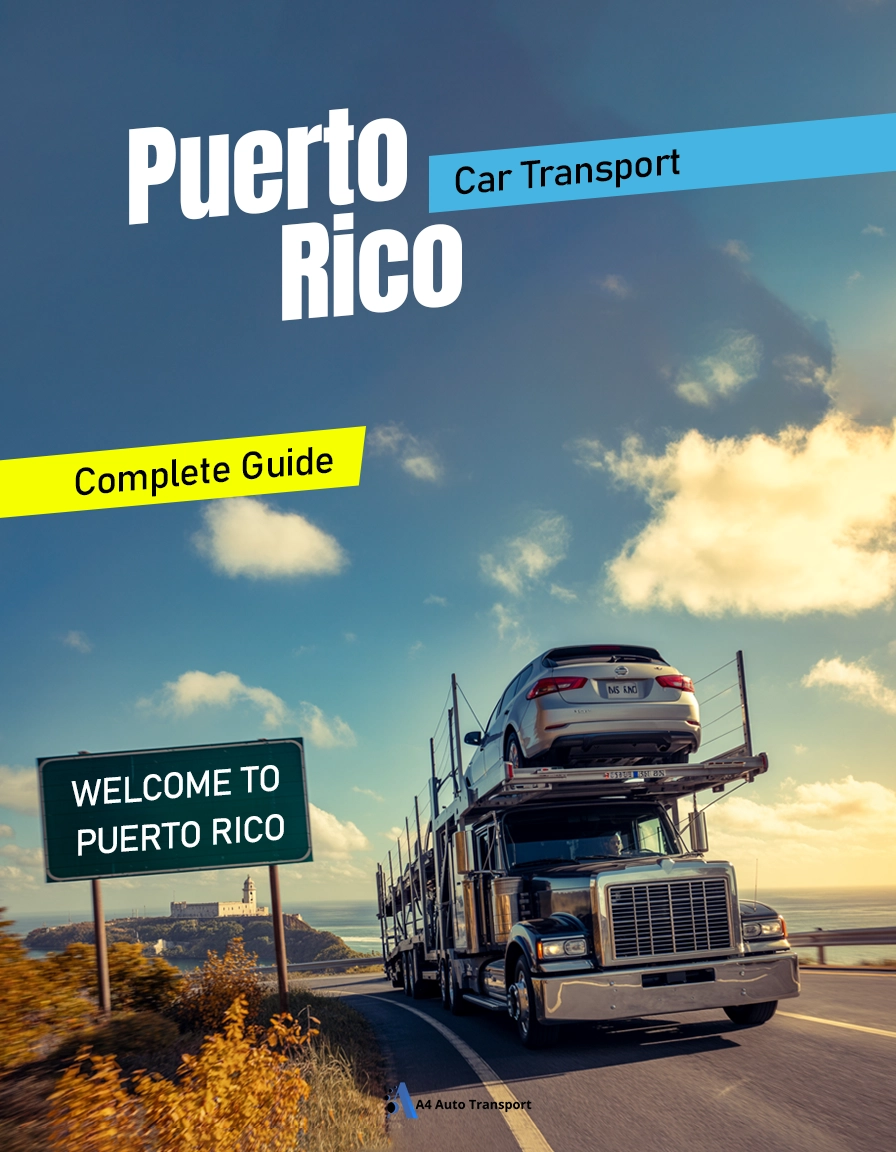Puerto Rico Car Transport: Top Companies, Costs & Key Info
Your Guide to Puerto Rico Car Shipping
If you’re planning to ship a car to or from Puerto Rico, don’t rush into it. Taking the time to understand the unique details and challenges first can save you. At A4 Auto Transport we’ve gained plenty of experience guiding people through the unique challenges of shipping cars to and from Puerto Rico.
First of all, it’s crucial to start by choosing a reliable auto transport company experienced with Puerto Rico routes.


Best Company to Ship a Car To/From Puerto Rico

AutoStar Transport Express
How to Ship a Car To/From Puerto Rico: The Steps
Below is a breakdown of the essential steps you’ll need to follow to ship your car to or from Puerto Rico smoothly and without surprises.
Request and Compare Quotes
Start by gathering quotes from 3 to 5 carriers or brokers at least 2 to 3 weeks before your shipping date. Properly compare what each quote includes. Learn how to obtain and compare car shipping quotes .
Pick a Company Familiar with Puerto Rico Shipping
Puerto Rico’s shipping process involves working with ports in San Juan and other locations. Choose a licensed, insured company experienced with ocean freight, customs clearance, and local Puerto Rico regulations.
Book Your Shipment the Right Way
After selecting a company, they will arrange your car’s shipment on a scheduled vessel and confirm pickup or drop-off dates. Most reputable businesses do not require full payment until the shipping slot is secured.
Gather Your Paperwork
Have your documents ready to avoid delays. You’ll need the vehicle title, current registration, valid photo ID, and the Bill of Lading from your carrier. Don’t forget to complete any customs forms required for Puerto Rico. Recommended: Check out car shipping documents.
Prepare Your Vehicle for Shipping
Wash your vehicle thoroughly so pre-existing damage is clear. Remove all personal items, especially valuables.
Be Ready for Pickup and Delivery
If shipping from the mainland U.S., your car will be picked up and transported to the port. In Puerto Rico, be prepared to pick up your vehicle at the designated port or terminal.
Inspect Your Car at Delivery
Before signing the Bill of Lading or releasing paperwork, carefully inspect your car and compare it to your photos taken before shipping. Note any damage immediately to protect your claim. Consider exploring ways to ship a car.
Popular State-to-State Car Shipping Routes Involving Puerto Rico
From what we’ve seen, this is the route most customers choose when they need speed, flexibility, and easy port access.
Peak season pricing: Higher rates during winter months due to increased demand from snowbirds
This route works best for shippers who want frequent sailings and flexible service options.
Return shipping: Many customers book round-trip shipments for seasonal vehicles
Jacksonville is a smart choice if you want to avoid congestion at larger Florida ports. Customers often pick this route for smoother customs clearance and less waiting time.
Broker services: Many auto transport brokers have established relationships with Jacksonville carriers
For people shipping from the Southeast, Jacksonville offers one of the most reliable schedules. It’s a go-to for dealers and military moves because of the steady rates and secure facilities.
Port security: Enhanced security measures for all vehicle shipments
This route takes a little more coordination, since it combines ocean and overland transport. We often recommend it for customers moving inland who need one seamless shipping plan.
Cost variables: Distance from port to final destination significantly affects pricing
If you’re in Texas, expect a slightly longer process because of the inland transport to the port. Customers who plan pickup dates carefully tend to avoid extra storage fees and delays.
Seasonal variations: Winter weather can affect inland pickup schedules
This route is popular for people who need direct access to the Northeast. It’s also a good option if you want reliable delivery timelines.
Winter considerations: Vehicles may need winterization before New York delivery
This route is great for avoiding harsh winters and keeping vehicles in top condition. People ship down in the fall to escape snow and road salt.
Salt protection: Vehicles benefit from being removed from road salt environments
Puerto Rico Car Shipping Costs & Transit Times
Below is a breakdown of Puerto Rico car shipping costs and transit times for different routes and service options.
| Route Type | Distance Range | Open Transport | Enclosed Transport | Delivery Time |
|---|---|---|---|---|
| Local Mainland Port (Florida to/from Puerto Rico) | 0 – 200 miles | $1,000 – $1,400 | $1,100 – $1,700 | 4 to 6 days |
| East Coast to/from Puerto Rico (e.g., NY, NJ) | 1,100 – 1,300 miles | $1,100 – $1,700 | $1,100 – $1,700 | 4 to 7 days |
| Gulf States to/from Puerto Rico (e.g., TX, LA) | 1,300 – 1,700 miles | $1,200 – $1,800 | $1,200 – $1,800 | 5 to 8 days |
| Midwest to/from Puerto Rico (e.g., IL, OH) | 1,500 – 2,000 miles | $1,400 – $2,200 | $1,400 – $2,200 | 7 to 11 days |
| West Coast to/from Puerto Rico (e.g., CA, WA) | 2,000 – 3,000+ miles | $1,500 – $2,300 | $1,800 – $2,500+ | 7 to 14 days |
Disclaimer:These prices and delivery times are estimates and may vary based on factors. Always request a personalized quote from the best car shipping companies.
Factors Affecting the Car Shipping Costs in Puerto Rico
Below are some key factors that often get overlooked by Puerto Rico car shippers, but they can make a big difference in what you actually pay.
-
Type of Shipping (RoRo vs Container) Determines Final Price
Roll-on/Roll-off (RoRo) shipping is more affordable, while container shipping is more secure but significantly more expensive. -
Port Access and Drop-Off Options Affect Convenience and Pricing
Vehicles must be dropped off and picked up at major ports like San Juan; door-to-door service is limited and expensive. -
Customs and Documentation Requirements Add Fees
Even though Puerto Rico is a U.S. territory, imported vehicles must clear customs and pay port processing fees. -
Weather and Hurricane Season Cause Delays and Rate Changes
Tropical storms and hurricanes can disrupt shipping schedules, leading to delays or temporary price surges. -
Limited Carrier Options and Vessel Schedules Raise Costs
Fewer shipping companies operate routes to Puerto Rico, and vessel departure dates are fixed, reducing flexibility and increasing demand-based pricing. -
Vehicle Size and Weight Significantly Impact Shipping Costs
Because vehicles must be loaded onto a vessel, heavier or larger cars incur noticeably higher ocean freight charges. -
Distance Includes Ocean Freight from the Mainland U.S.
Shipping to Puerto Rico from states like Florida or New York involves both overland and sea travel, increasing overall cost.
Do Seasonal Changes Have Any Effect on Car Shipping To/From Puerto Rico?
Yes, and it’s something many shippers underestimate. During hurricane season (June–November), shipments normally take 6 days stretch to 10+ due to rerouted vessels or temporary port closures.
Peak times like summer or winter holidays can also raise prices and limit availability. There had been many people who booked late and paid $400 more than if they’d scheduled a month earlier.
From our experience, the best move is to book early and choose a company seasoned in Puerto Rico routes, it can save you both time and money.

Which Is Better for Puerto Rico Car Shipping: RoRo or Container Car Shipping?
Both RoRo (Roll-on/Roll-off) and container car shipping have their advantages, and the better option depends on your vehicle type, budget, and shipping needs:
RoRo
is more cost-effective and ideal for operable vehicles. Your car is driven onto the ship and secured inside the vessel. It’s the most commonly used method for standard car transport to/from Puerto Rico.
Container shipping
offers added protection and is better suited for high-value, classic, or non-running vehicles. It’s also preferred if you’re shipping household goods with your car (when allowed).
If you’re unsure which is best for your situation, check out detailed guide on RoRo vs. containerized shipping.
Which Ports Are Used for Puerto Rico Car Transport?
Departure Ports (U.S.)
Jacksonville, FL and Port Everglades (Miami), FL
Arrival Port (Puerto Rico)
Best port but it requires extra coordination.
Other Possible Ports
Occasionally, New York or other East Coast ports may be used by specific carriers
Can You Ship Personal Belongings in Your Car to Puerto Rico?
Most car shipping companies and port authorities do not allow personal belongings to be left inside the vehicle during transport to or from Puerto Rico. This is primarily due to customs regulations, safety concerns, and liability issues, as items inside the car are not covered by transport insurance.
Additionally, extra weight can affect shipping costs and may result in delays or denied entry at the port. If you need to ship household items, it’s recommended to do so through a separate, approved cargo service.
Are There Restrictions on the Type of Vehicles You Can Ship to Puerto Rico?
Yes, Puerto Rico has specific restrictions on vehicle imports, including limitations on older models, non-compliant emissions vehicles, and certain commercial or oversized vehicles. It’s important to verify that your vehicle meets local regulations before shipping to avoid delays or additional fees.
What Are Puerto Rico DOT & Port Authority Regulations for Auto Transport Companies?
Shipping a car to or from Puerto Rico isn’t just about booking a carrier, there are strict U.S. Department of Transportation and Puerto Rico Port Authority rules that ensure safety and compliance. Knowing them can save you from last-minute issues at the dock.
USDOT & MC Authority
All ocean carriers and inland transport partners must have valid USDOT numbers and Motor Carrier (MC) authority to operate legally in Puerto Rico and the mainland U.S.
Maritime Compliance
Vessels must comply with Jones Act regulations, meaning only U.S.-built, U.S.-owned, and U.S.-crewed ships can operate between Puerto Rico and the mainland.
Vehicle Safety Checks
Ports like San Juan require proof that the vehicle is operable or, if non-running, that special arrangements have been made for loading.
Fuel & Battery Rules
For safety, vehicles must have no more than ¼ tank of fuel, and batteries must be properly secured before loading.
Port Access Requirements
Shippers must follow scheduled delivery windows to avoid congestion at busy docks like San Juan.
How Can You Avoid Auto Transport Scams in Puerto Rico?
Most companies handling Puerto Rico car shipping are legitimate, but I’ve seen cases where customers lost money because they didn’t verify a carrier’s credentials. Here’s how to protect yourself:
- Check Licensing:
Make sure the carrier or broker is licensed by the Federal Motor Carrier Safety Administration (FMCSA) and authorized for Puerto Rico shipments. - Confirm Port Agent Details:
Scammers sometimes pose as legitimate port agents. Always verify the agent with the Puerto Rico Port Authority. - Beware of Lowball Quotes:
If someone offers to ship your car for hundreds less than market average, it’s often a bait-and-switch tactic.
For more, check a detailed guide on avoiding auto transport scams so you can ship worry-free.
What Puerto Rico-Specific Shipping Laws Should You Know?
Puerto Rico has a few unique rules that mainland shippers might not expect. Being aware of these can help you avoid delays and unexpected costs.
Customs Clearance
All vehicles entering Puerto Rico must clear U.S. Customs, even though it’s a U.S. territory. Missing paperwork can delay release by days.
Excise Tax Requirements
Puerto Rico’s Department of Treasury (Hacienda) may charge excise tax on incoming vehicles based on make, model, and year — unless you qualify for exemptions.
Written Contracts
Shipping agreements must clearly state port of departure, arrival location, estimated transit time, and total charges.
Can You Ship an Electric or Hybrid Vehicle to Puerto Rico?
Yes, electric and hybrid vehicles can be shipped to Puerto Rico, but carriers may have special handling requirements due to battery safety regulations. Be sure to inform your shipping company in advance so they can prepare accordingly and ensure compliance with port and shipping rules.
How Do You Pay the Import Duties or Excise Tax When My Vehicle Arrives in Puerto Rico?
Import duties and excise taxes are typically paid through the Puerto Rico Department of Treasury (Hacienda) after your vehicle arrives. You may need to work with a customs broker or pay directly at the port, depending on the shipping arrangement and carrier policies.
Is There a Required Emissions or Safety Inspection for Cars Shipped to Puerto Rico?
Yes, vehicles imported to Puerto Rico must pass local emissions and safety inspections before they can be registered. It’s important to check that your car complies with Puerto Rico’s environmental standards to avoid registration issues.
Can You Use the Open Carrier Car Shipping Option for Puerto Rico Car Transport?
One of the most popular and cost-effective options for transporting cars to and from Puerto Rico, especially for operable vehicles, is open carrier car shipping. However, since Puerto Rico shipments involve ocean transport, your car will typically be driven onto the ship (RoRo) after reaching the port. While open carriers are common on the mainland, the ocean leg requires RoRo or container shipping. It’s important to confirm with your carrier how your vehicle will be handled throughout the entire journey.
Is Door-to-Door Service Available for Puerto Rico Car Shipping?
Yes, many Puerto Rico car shipping companies offer door-to-port and port-to-door services. This means they can pick up your vehicle directly from your home and handle all port logistics, then deliver it to your specified address, providing a convenient and seamless shipping experience.
Can You Ship a Non-Running Car to Puerto Rico?
Yes, you can ship a non-running car to Puerto Rico. However, this usually requires container shipping or specialized equipment to safely transport the vehicle, which can increase the overall cost compared to shipping operable cars.
Is Car Shipping to Puerto Rico Safe During Hurricane Season?
Shipping during hurricane season is generally safe if you use reputable companies. They closely monitor weather forecasts and may adjust schedules to avoid storms. It’s also wise to ensure your vehicle is fully insured, especially when shipping during peak storm months.
How Far in Advance Should I Book Puerto Rico Car Transport?
It’s recommended to book your Puerto Rico car shipping at least 1 to 2 weeks in advance. During busy times like summer and holidays, booking early helps secure availability and better rates, avoiding last-minute delays or price hikes.
Recommended Car Shipping Companies for Puerto Rico
For Puerto Rico’s unique island shipping needs, we’ve identified four top providers based on our extensive experience.
AutoStar Transport Express

Autostar Transport Express is known for seamless door-to-port service and reliable vehicle shipping to and from Puerto Rico. Their extensive experience with major U.S. ports and attentive customer support make them a top choice for hassle-free island transport.
Montway Auto Transport

Montway offers strong carrier coverage and smooth coordination for mainland-to-Puerto Rico shipments. Their fast service and responsive customer care make them a solid option for Puerto Rico car shipping.
SGT Auto Transport

SGT provides dependable car shipping services with multiple transport options tailored to Puerto Rico routes. They are a trusted choice for both inbound and outbound shipments.
These recommendations come from real experience and customer feedback. To secure the best price and service, we always suggest requesting and comparing multiple quotes from these best car shipping companies.
Conclusion
Car transport to Puerto Rico and from Puerto Rico requires careful planning and choosing the right shipping method to ensure a smooth and secure delivery. Whether you opt for RoRo or container shipping, door-to-door service, or need to ship a non-running vehicle, working with experienced and reliable carriers is essential.
FAQs
How long does the entire shipping process take?
Are there special insurance options for Puerto Rico car shipping?
Can classic or antique cars be shipped safely to Puerto Rico?
What if my vehicle has aftermarket parts or modifications?
Are there restrictions for shipping commercial vehicles to Puerto Rico?
How does shipping differ for residents versus businesses?

a4AutoTransport is a group of auto transport researchers and experts that comes in handy for anyone who wants to move their car/vehicle without putting extra miles on the odometer. At a4AutoTransport, We researched over a hundred car shipping companies, interviewed real customers and industry leaders, and collected nearly 500 quotes to find the nation’s best auto transport companies. With our combined 5 years of industry experience and research, we’ll help you find the right car shipper for your budget.
